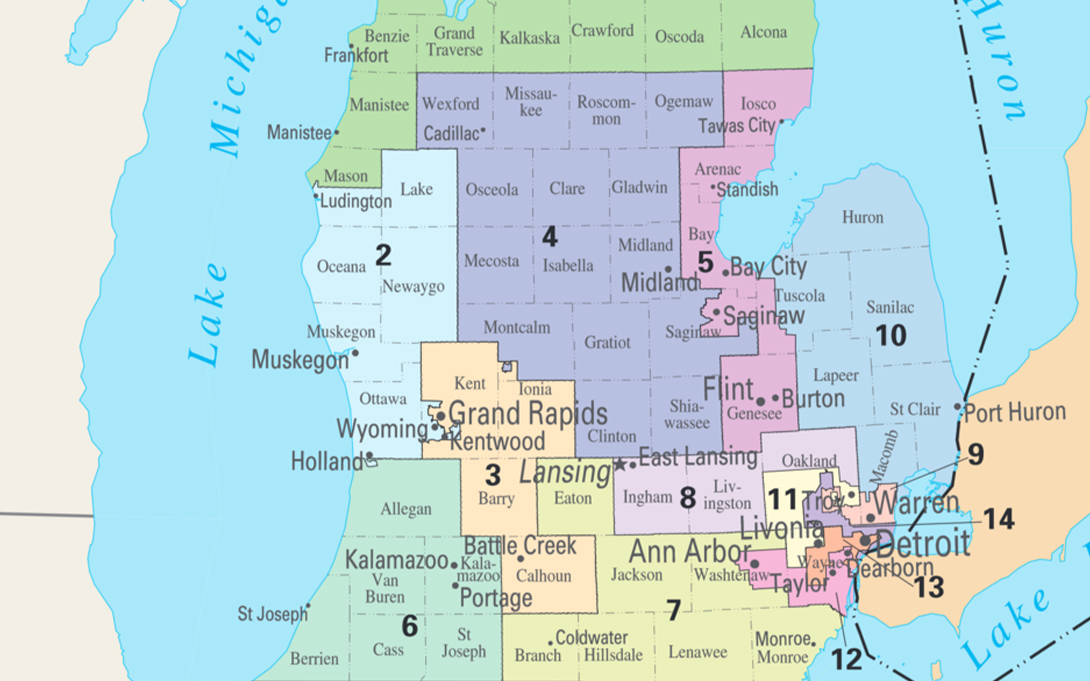
Michigan’s local government leaders reported mixed familiarity with the state’s new approach to redistricting, according to a 2020 survey whose results were released today by the the Center for Local, State, and Urban Policy (CLOSUP) at the University of Michigan’s Gerald R. Ford School of Public Policy.
It takes time for understanding of complex policy issues to be absorbed across a state as large and diverse as Michigan, so this report shows the Commission has its work cut out, to help lead a successful statewide effort under this new approach to redistricting.
Tom Ivacko, CLOSUP executive director
In 2018, Michigan voters approved a Constitutional amendment (Proposal 2) to change how redistricting is done in the state, removing the process from the purview of the state legislature and placing it in the hands of the new Michigan Independent Citizens Redistricting Commission (MICRC).
When asked in the spring of 2020—when Michigan residents were applying to serve on the new Commission, —just under half (49%) of local government leaders “had heard of it, and understood it fairly well, but didn't know many details” while 9% were very familiar and knew a great deal about the Redistricting Commission. By contrast, well over a third (41%) were either somewhat unfamiliar (29%), completely unfamiliar (6%), or didn’t know (6%) about the Redistricting Commission, even when prompted with a description of 2018’s Proposal 2 ballot measure that established it through a Constitutional amendment.
Leaders from the largest (over 30,000 residents) or more urban jurisdictions were more likely to be familiar with the new Redistricting Commission.
“It takes time for understanding of complex policy issues to be absorbed across a state as large and diverse as Michigan, so this report shows the Commission has its work cut out, to help lead a successful statewide effort under this new approach to redistricting,” said Tom Ivacko, executive director of CLOSUP.
The new Constitutional amendment came with a mandate: the new district maps must address "communities of interest" (COIs). The goal is to avoid splitting key community groups across multiple districts, and instead try to ensure they have cohesive legislative representation by keeping the COIs intact within districts.
Nearly half (46%) of local officials were not aware of any significant local COIs, or believed the question is not applicable to their jurisdiction, or that the concept of COIs and/or the new redistricting process are simply not legitimate, or did not understand the question. But many indicated interest in seeing their jurisdictions themselves kept whole, and not split across electoral districts, as well as being kept in common districts with neighboring jurisdictions with whom they have significant shared interests.
We hope that as the Commission begins to conduct town halls across the state, it becomes better understood how communities and individuals can provide input into the process.
Debra Horner, MPPS project manager
Debra Horner, project manager for the Michigan Public Policy Survey, said, “The definition of ‘communities of interest’ is fairly vague, so it’s no surprise many of our local officials were uncertain about what COIs may be in their area. We hope that as the Commission begins to conduct town halls across the state, it becomes better understood how communities and individuals can provide input into the process.”
Findings included in the report are based on statewide surveys of local government leaders in the Spring 2020 wave of the Michigan Public Policy Survey (MPPS), conducted between March 30 and June 1, 2020.
The full report can be viewed here.
Launched in the wake of the Great Recession in 2009 by CLOSUP, the MPPS is conducted in partnership with the Michigan Association of Counties, Michigan Municipal League, and Michigan Townships Association. It is one of several ways the Ford School, now ranked as the #5 public policy program for environmental policy, provides cross-disciplinary expertise at multiple levels of governance.
The Center for Local, State, and Urban Policy is a University-wide resource housed at the University of Michigan's Gerald R. Ford School of Public Policy. CLOSUP functions as an information resource for policymakers and practitioners, academics, students, the media, and the public. The Center works to foster effective communication between academic researchers, stakeholders, and the policymakers dealing with today's state, local, and urban policy problems. The Center also facilitates student learning and engagement with today’s critical policy issues.
